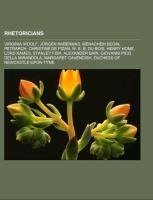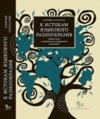
-
 Anglický jazyk
Anglický jazyk
Rhetoricians
Autor: Source: Wikipedia
Source: Wikipedia. Pages: 125. Chapters: Virginia Woolf, Jürgen Habermas, Menachem Begin, Petrarch, Christine de Pizan, W. E. B. Du Bois, Henry Home, Lord Kames, Stanley Fish, Alexander Bain, Giovanni Pico della Mirandola, Margaret Cavendish, Duchess of... Viac o knihe
Na objednávku, dodanie 2-4 týždne
25.87 €
bežná cena: 29.40 €
O knihe
Source: Wikipedia. Pages: 125. Chapters: Virginia Woolf, Jürgen Habermas, Menachem Begin, Petrarch, Christine de Pizan, W. E. B. Du Bois, Henry Home, Lord Kames, Stanley Fish, Alexander Bain, Giovanni Pico della Mirandola, Margaret Cavendish, Duchess of Newcastle-upon-Tyne, Giambattista Vico, Hélène Cixous, Herbert Spencer, Mikhail Bakhtin, Eugenio Espejo, Henry Louis Gates, Richard M. Weaver, Stephen Toulmin, Chaïm Perelman, Jean-François Lyotard, George Campbell, Clifford Geertz, Frances Willard, List of feminist rhetoricians, Petrus Ramus, Geoffrey of Vinsauf, Gloria E. Anzaldúa, Maria W. Stewart, Gilbert Austin, Juana Inés de la Cruz, Lorenzo Valla, Fred Newton Scott, I. A. Richards, Jane Ellen Harrison, Kenneth Burke, Deirdre McCloskey, Richard Whately, Dilip P. Gaonkar, Juan Luis Vives, Mary Astell, Ali Ahmad Kurd, Thomas Sheridan, Margaret Fell, Thomas Wilson, Johannes de Garlandia, Miguel Ángel Garrido Gallardo, Frances Harper, Michael Leff, George Beswick Hynson, Phoebe Palmer, Stephen Ziliak, Feofan Prokopovich, Marcel Detienne, Gresham Professor of Rhetoric, Teofil Rutka, Greg Clark, Benjamin Hedericus, Emporius. Excerpt: Herbert Spencer (27 April 1820 - 8 December 1903) was an English philosopher, biologist, sociologist, and prominent classical liberal political theorist of the Victorian era. He has been described as "almost certainly the most famous philosopher of the Victorian age." Spencer developed an all-embracing conception of evolution as the progressive development of the physical world, biological organisms, the human mind, and human culture and societies. He was "an enthusiastic exponent of evolution" and even "wrote about evolution before Darwin did." As a polymath, he contributed to a wide range of subjects, including ethics, religion, anthropology, economics, political theory, philosophy, biology, sociology, and psychology. During his lifetime he achieved tremendous authority, mainly in English-speaking academia. "The only other English philosopher to have achieved anything like such widespread popularity was Bertrand Russell, and that was in the 20th century." In 1902 he was nominated for the Nobel Prize in Literature. Indeed, in the United Kingdom and the United States at "one time Spencer's disciples had not blushed to compare him with Aristotle!" He is best known for coining the concept "survival of the fittest", which he did in Principles of Biology (1864), after reading Charles Darwin's On the Origin of Species. This term strongly suggests natural selection, yet as Spencer extended evolution into realms of sociology and ethics, he also made use of Lamarckism. Herbert Spencer was born in Derby, England, on 27 April 1820, the son of William George Spencer (generally called George). Spencer's father was a religious dissenter who drifted from Methodism to Quakerism, and who seems to have transmitted to his son an opposition to all forms of authority. He ran a school founded on the progressive teaching methods of Johann Heinrich Pestalozzi and also served as Secretary of the Derby Philosophical Society, a scientific society which had been founded in the 1790s by Erasmu
- Vydavateľstvo: Books LLC, Reference Series
- Rok vydania: 2013
- Formát: Paperback
- Rozmer: 246 x 189 mm
- Jazyk: Anglický jazyk
- ISBN: 9781156586068




 Nemecký jazyk
Nemecký jazyk 

 Ruský jazyk
Ruský jazyk 



